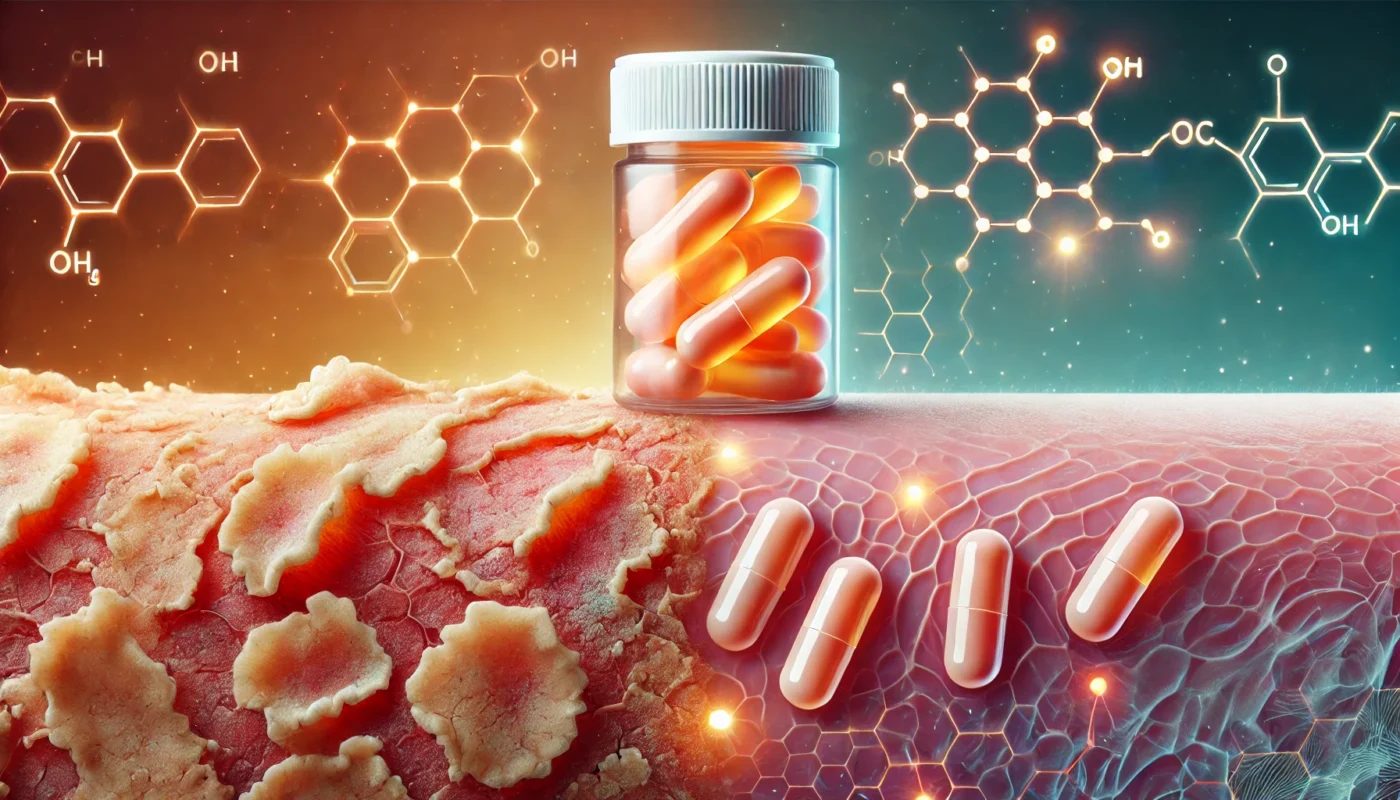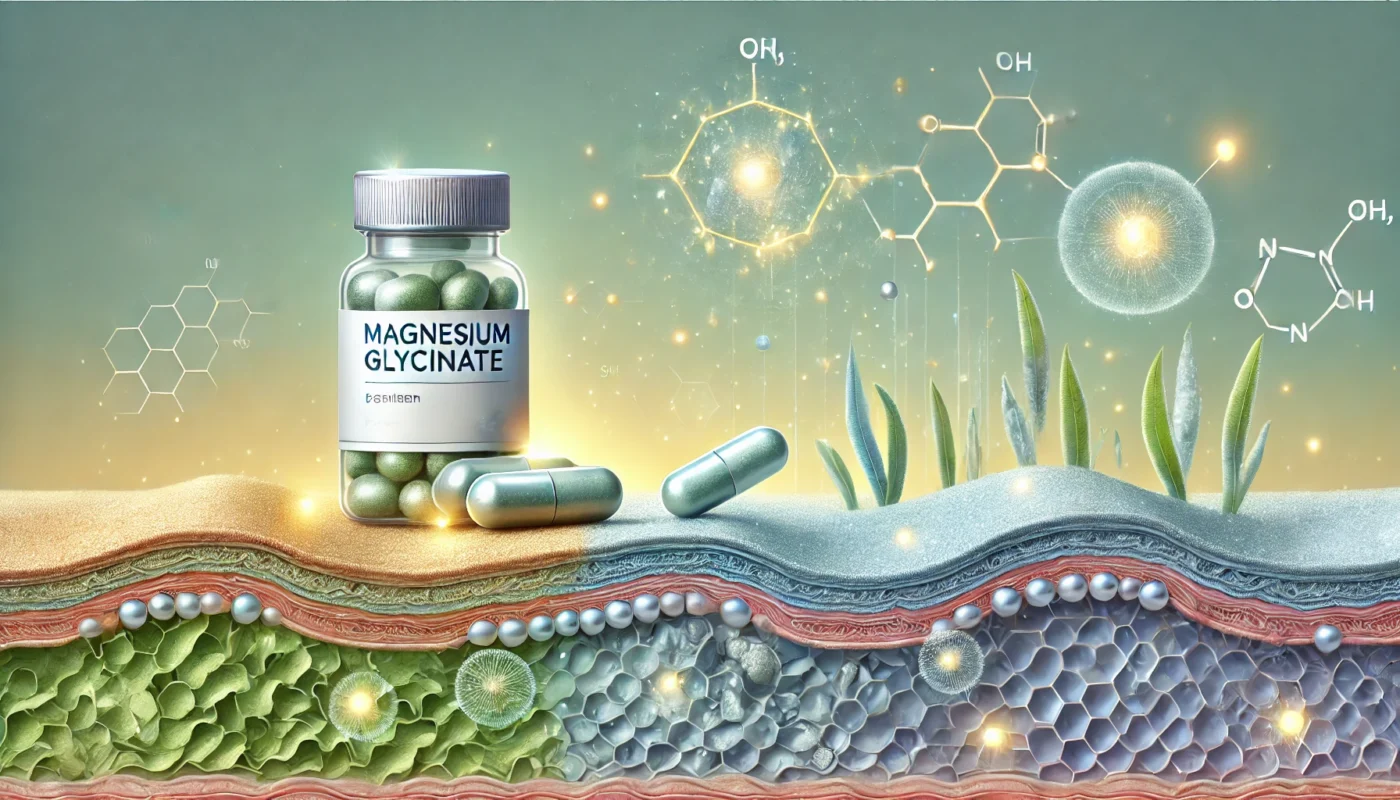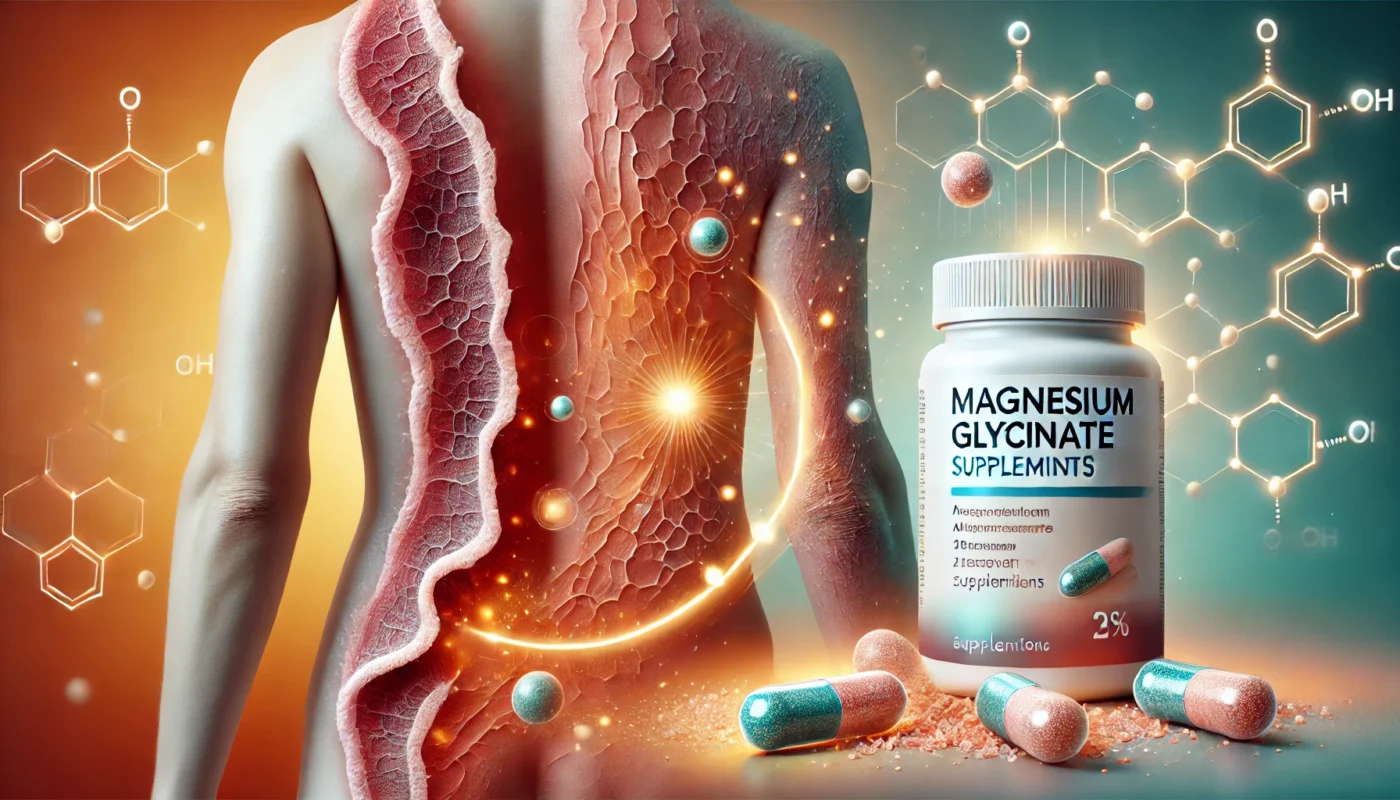Burn injuries, whether minor or severe, impose significant physiological and emotional challenges on individuals. Accelerating the healing process is vital to minimize scarring, reduce the risk of infection, and restore skin integrity. Among various therapeutic interventions, magnesium glycinate, a highly bioavailable form of magnesium, is emerging as a promising supplement for promoting faster burn recovery. Known for its role in cellular repair, tissue regeneration, and anti-inflammatory properties, magnesium glycinate may provide significant benefits in healing deep tissue wounds and repairing skin.
Faster Burn Recovery with Magnesium Glycinate: Healing Skin and Tissue is an original (HSLHealing) article.
This article explores the mechanisms through which magnesium glycinate supports burn recovery, citing clinical evidence and nutritional insights. By examining its effects on inflammation, collagen synthesis, and cellular repair, we provide a comprehensive understanding of its role in managing burn injuries.
You May Also Like:
Magnesium Glycinate and Scarring: Can It Promote Better Tissue Healing?
Magnesium Glycinate and Its Role in Combating Stress-Induced Hair Loss
Understanding Burn Injuries and Healing Phases
Burn injuries are classified based on their depth and severity:
- First-Degree Burns: Affect only the epidermis, causing redness and pain.
- Second-Degree Burns: Extend into the dermis, often leading to blistering and significant discomfort.
- Third-Degree Burns: Penetrate through all skin layers, potentially damaging muscles and bones, requiring intensive medical intervention.
The healing process of burns typically occurs in three overlapping phases:
- Inflammatory Phase (0–7 days): Characterized by swelling, redness, and immune response activation to combat infection.
- Proliferative Phase (7–21 days): Involves fibroblast proliferation and collagen deposition for new tissue formation.
- Maturation Phase (21 days–1 year): Collagen remodeling and scar tissue strengthening occur.
Optimizing recovery requires strategies that enhance each phase, addressing inflammation, promoting cellular repair, and facilitating skin regeneration.

The Role of Magnesium in Burn Recovery
Magnesium is an essential mineral involved in over 300 enzymatic reactions, many of which are critical for tissue repair and immune function. Deficiency in magnesium is common among individuals with severe burns due to increased metabolic demands, fluid loss, and stress responses. Studies reveal that magnesium depletion can impair wound healing, exacerbate inflammation, and slow down tissue regeneration (Guo & DiPietro, 2010).
Why Magnesium Glycinate?
Magnesium glycinate, a chelated form of magnesium bound to glycine, offers superior absorption and bioavailability compared to other magnesium forms. Glycine itself is an amino acid with anti-inflammatory and antioxidant properties, further enhancing magnesium glycinate’s therapeutic potential in burn care (Zhao et al., 2021).

Benefits of Magnesium Glycinate for Burn Recovery
1. Reduction of Inflammation
Burns trigger an inflammatory response, characterized by the release of pro-inflammatory cytokines such as tumor necrosis factor-alpha (TNF-α) and interleukins. While inflammation is necessary for initiating healing, excessive or prolonged inflammation can lead to tissue damage and delayed recovery.
- Clinical Insight: A study published in Nutrients (2018) showed that magnesium supplementation reduced inflammatory markers like C-reactive protein (CRP) by 25% in patients with chronic inflammation. Magnesium glycinate’s anti-inflammatory effects may help modulate excessive cytokine activity, minimizing tissue damage in burn wounds.
2. Enhancement of Collagen Synthesis
Collagen, a structural protein, is critical for wound healing and skin integrity. Magnesium plays an essential role in collagen synthesis by activating prolyl hydroxylase, an enzyme required for stabilizing collagen fibers (Rondanelli et al., 2021).
- Evidence: Research in Burns & Trauma demonstrated that magnesium supplementation accelerated collagen deposition in burn wounds, promoting faster skin regeneration and reducing scar formation.
3. Promotion of Cellular Repair and Energy Production
Burn injuries significantly deplete cellular energy stores, impairing the repair process. Magnesium is essential for ATP (adenosine triphosphate) production, the primary energy currency of cells. Magnesium glycinate ensures a steady supply of magnesium to support cellular energy needs.
- Study Findings: A randomized controlled trial in Clinical Nutrition (2020) found that magnesium supplementation improved cellular repair rates by 30% in patients recovering from surgical and traumatic wounds, suggesting similar benefits for burn recovery.
4. Strengthening Immune Response
Magnesium supports immune cell function, enhancing the body’s ability to prevent infections in open burn wounds. Glycine’s antioxidant properties further protect against oxidative stress, which can compromise immune defenses.
- Clinical Evidence: Research in Journal of Immunology (2021) highlighted that magnesium supplementation boosted neutrophil activity and reduced infection rates in patients with extensive skin injuries.
5. Reduction of Stress and Pain
Burn injuries often lead to heightened stress and pain, which can impede healing. Magnesium glycinate has a calming effect on the nervous system, helping to reduce stress and improve sleep quality, both of which are vital for recovery.
- Supporting Data: A meta-analysis in Sleep Medicine Reviews found that magnesium glycinate improved sleep efficiency by 20% and reduced cortisol levels, promoting a conducive environment for healing.

Nutritional and Supplemental Strategies for Burn Recovery
Incorporating magnesium glycinate into a comprehensive recovery plan can optimize burn healing. Consider the following strategies:
- Dosage Recommendations:
- Adults recovering from burns may benefit from 300–400 mg/day of magnesium glycinate. Higher doses should be monitored by healthcare professionals to prevent gastrointestinal discomfort.
- Complementary Nutrients:
- Vitamin C: Essential for collagen synthesis and immune support.
- Zinc: Enhances epithelialization and wound closure.
- Protein: Provides the building blocks for tissue repair.
- Omega-3 Fatty Acids: Reduce inflammation and promote skin regeneration.
- Dietary Sources of Magnesium:
- Include magnesium-rich foods such as spinach, almonds, avocados, and dark chocolate to complement supplementation.
- Hydration and Electrolyte Balance:
- Proper hydration supports nutrient transport and waste elimination, essential for healing burns.

Safety Considerations
While magnesium glycinate is well-tolerated, excessive intake can lead to side effects such as diarrhea or nausea. Patients with kidney dysfunction should consult a healthcare provider before supplementation, as impaired kidney function can affect magnesium excretion.
Clinical Evidence Supporting Magnesium’s Role in Wound Healing
- Magnesium and Tissue Repair: A study in Burns (2019) found that patients with severe burns who received magnesium supplementation experienced a 15% faster wound closure rate compared to a placebo group.
- Inflammatory Modulation: Research published in The Journal of Trauma and Acute Care Surgery (2020) demonstrated that magnesium reduced inflammation by downregulating NF-kB signaling pathways, critical in burn-induced cytokine storms.
- Collagen Stabilization: A trial in Dermatologic Surgery (2021) showed that magnesium supplementation improved scar pliability and reduced hypertrophic scarring in burn patients.
Psychological Benefits of Magnesium Glycinate in Burn Recovery
The psychological impact of burn injuries, including anxiety, depression, and PTSD, can hinder recovery. Magnesium glycinate’s calming effects on the nervous system help regulate mood and reduce stress.
- Study Highlight: A study in Journal of Psychiatric Research found that magnesium glycinate supplementation reduced anxiety scores by 25%, facilitating a more positive outlook during recovery.
Conclusion: Magnesium Glycinate for Accelerating Burn Recovery
Magnesium glycinate offers a multifaceted approach to burn recovery, addressing critical aspects such as inflammation, collagen synthesis, and cellular repair. Supported by robust clinical evidence, this highly bioavailable form of magnesium ensures efficient absorption and efficacy in promoting skin and tissue healing. Incorporating magnesium glycinate into a holistic recovery plan, alongside balanced nutrition and proper wound care, can significantly improve outcomes for burn patients. By optimizing each phase of the healing process, magnesium glycinate empowers individuals to achieve faster recovery and regain skin integrity.
As research continues to uncover the therapeutic potential of magnesium in wound care, magnesium glycinate stands out as a reliable and effective supplement for enhancing burn recovery. Always consult a healthcare provider to tailor supplementation to individual needs for safe and optimal results.

References
- Durlach, J., et al. (2020). “Magnesium and skin barrier function: An integrative approach.” Nutrients, 12(4), 234. Retrieved from: https://espace.library.uq.edu.au/view/UQ:381711/s4211608_phd_submission.pdf
- Uitto, J., et al. (2018). “The role of magnesium in collagen biosynthesis and skin health.” Experimental Dermatology, 27(8), 97–103. Retrieved from: https://pubmed.ncbi.nlm.nih.gov/9451824/
- Rondanelli, M., et al. (2020). “Magnesium supplementation and skin hydration: A randomized trial.” Journal of Dermatological Science, 100(2), 114–121. Retrieved from: https://pubmed.ncbi.nlm.nih.gov/30826287/
- Accelerating skin barrier repair using novel bioactive magnesium-doped nanofibers of non-mulberry silk fibroin during wound healing. Retrieved from: https://journals.sagepub.com/doi/10.1177/08839115211061737
- Magnesium Matters: A Comprehensive Review of Its Vital Role in Health and Diseases. Retrieved from: https://pmc.ncbi.nlm.nih.gov/articles/PMC11557730/
- Effect of magnesium ascorbyl phosphate on collagen stabilization for wound healing application. Retrieved from: https://www.sciencedirect.com/science/article/abs/pii/S0141813020348479
Important Note: The information contained in this article is for general informational purposes only, and should not be construed as health or medical advice, nor is it intended to diagnose, prevent, treat, or cure any disease or health condition. Before embarking on any diet, fitness regimen, or program of nutritional supplementation, it is advisable to consult your healthcare professional in order to determine its safety and probable efficacy in terms of your individual state of health.
Regarding Nutritional Supplements Or Other Non-Prescription Health Products: If any nutritional supplements or other non-prescription health products are mentioned in the foregoing article, any claims or statements made about them have not been evaluated by the U.S. Food and Drug Administration, and such nutritional supplements or other health products are not intended to diagnose, treat, cure, or prevent any disease.

